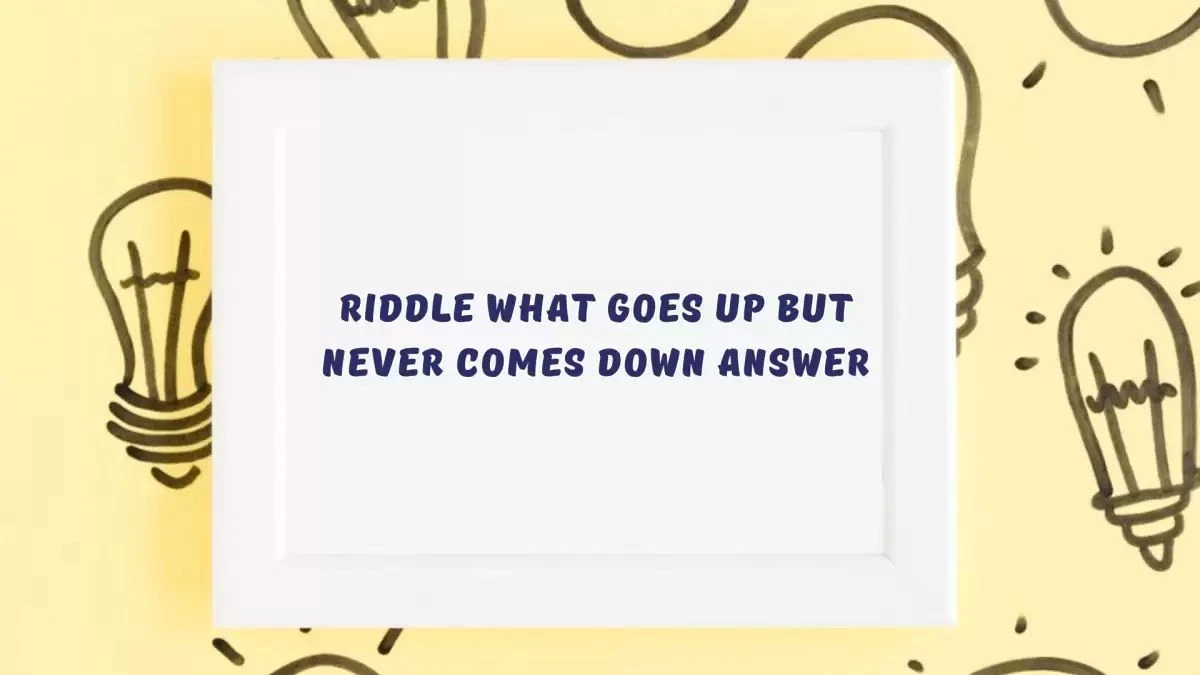- Rojgarlive »
- Riddle »
- What Goes Up But Never Comes Down - Revealing the Answer
What Goes Up But Never Comes Down - Revealing the Answer
by B Kishwar
Updated Feb 05, 2024

What is a Riddle?
A riddle is a form of word puzzle or enigma that challenges one's intellect and creativity. Typically posed as a question, it requires critical thinking to decipher its meaning or solve the puzzle. Riddles often rely on wordplay, ambiguity, or clever language, inviting individuals to unravel hidden meanings and think outside conventional patterns.
Found in various cultures throughout history, riddles serve as entertaining brain teasers, fostering cognitive skills and encouraging lateral thinking. They exist in diverse forms, from ancient folklore to modern literature, creating an engaging tradition of mental exploration and problem-solving within the context of linguistic and conceptual challenges.
Riddle What Goes Up But Never Comes Down - Answer Explained
The answer to What Goes Up But Never Comes Down Riddle is Age.
The riddle "What Goes Up But Never Comes Down" has “age” as its answer. It's like a fun brain teaser that makes you think. The reason behind this answer is quite simple. As time goes by, a person's age always increases, making them older and older, but it never goes back down. You can think of it like climbing up a ladder; you keep going higher but never come back down. It's a riddle that challenges our thinking and is often shared for some brainy fun.
Tips and Tricks Involved in Riddles
To effectively solve riddles, consider the following tips:
- Read the riddle carefully: Pay attention to details and potential clues within the riddle.
- Interpret literal and figurative meanings: Some riddles use words in unconventional ways, so think beyond their literal definitions.
- Consider the context: The source and teller of the riddle may provide hints related to its answer.
- Embrace your imagination: Think creatively and explore unconventional ideas to solve the riddle.
- Seek help if needed: Don't hesitate to ask riddle enthusiasts for assistance or join communities where people enjoy solving riddles.
- Break it down: Analyze the riddle's components separately to identify relationships between them.
- Look for patterns: Riddles often incorporate patterns or similarities that can guide you towards the answer.
- Utilize logic and reasoning: Apply critical thinking skills to deduce the solution.
- Enjoy the process: Solving riddles should be an enjoyable experience, so have fun while challenging yourself.
- Practice makes perfect: With time and practice, you'll become more skilled at solving riddles.
What Goes Up But Never Comes Down - FAQs
A riddle is a word puzzle or enigma that challenges thinking, often posed as a question, requiring creative interpretation to solve.
Riddles work by employing wordplay, ambiguity, or clever language, prompting individuals to decipher hidden meanings and think beyond conventional patterns.
Riddles serve as entertaining brain teasers, fostering cognitive skills and encouraging lateral thinking. They have a rich history across various cultures.
Riddles can be found in diverse forms, from ancient folklore to modern literature, creating a tradition of mental exploration within linguistic and conceptual challenges.
Riddles contribute to intellectual development by engaging individuals in problem-solving, promoting critical thinking, and offering an enjoyable means of exercising the mind.




